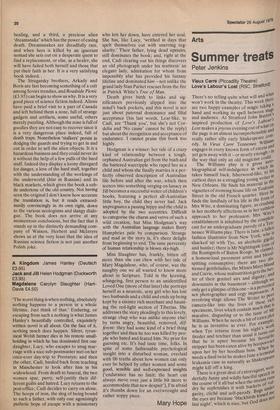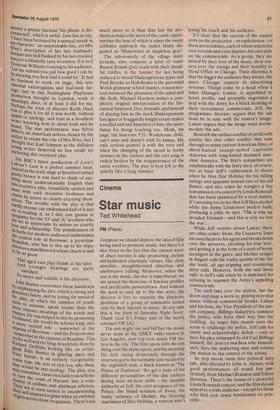Arts
Summer treats
Peter Jenkins
Vieux Carrie (Piccadilly Theatre) Love's Labour's Lost (RSC, Stratford) There's no telling quite what will and whet won't work in the theatre. This week the are two happy examples of magic taking a hand and working its spell between star and audience. At Stratford John Barton i ,s nspired production of Love's Labours Lost makes a joyous evening out of what on the page is an almost incomprehensible and really rather silly early Shakespeare corn. edy. In Vieux Carre Tennessee Will i ienS engages n every known form of excess anA" yet gets away with it -or nearly enough-11i the way that only an old magician CO' The Williams play is a gross auto' biographical self-indulgence in which he takes himself back, Isherwood-like, to his i earliest days as a struggling young writer n New Orleans. He finds his material in the vignettes of rooming house life on Toulouse Street in the old French quarter. Here he, finds the landlady of his life in the form. nt M. rs Wire, a dominating figure, as crushing in her motherly affections as in her ruthless approach to her profession. Mrs Wire s establishment is inhabited by the comPlete cast for an undergraduate parody of a Tell" nessee Williams play. There is Jane, a fallen fashion illustrator from New York, who is shacked up with Tye, an alcoholic and hustler; there is Mr Nightingale (one 01 the Rossignols of Baton Rouge, he claut a homoseicual pavement artist and bloo. spitting consumptive; there are two disd tressed gentleladies, the Misses Mary Matl„. and Carrie, whose malnutrition gets the bad ter of their genteel airs and dignity; and downstairs in the basement although wd only get a glimpse of this one is a perve. rteA sex photographer and orgy revolving stage allows The Writer to rich specimens,camera-like into the lives of these rte., specimens, lives which contain much tha!,..1' macabre, disgusting or to the taste of T`, Williams. When he needs a bit of extra 0.0:. he is as inventive as ever. For examPlrei when Tye returns from his night's w°iit im presario. tireder and tetchier than usual it turns 0 that he is upset because ..„, his favourt't stripper has been eaten alive by hOOPOe5se n he upon her by her hoodlum boss.Whe . needs a final twist he makes Jane a termill,e leukemia case as naturally as ShakesPe' might kill off a king. There is a great deal of extravagant, wnl!. derfully funny and wildly fanciful spenell..011: the course of it all but when the streanif ryua. gdry r t yh crleicphleén ai snhde ss f with dbyu.c kBe4ss rtudn doel er the eyes are because 'blackbirds not last night', which is nice, but God does rtu answer a prayer because 'his phone is disconnected', which is awful. Jane has to say, have been betrayed by a sensual streak in My character,' an unspeakable line, yet Mrs Wire's description of her late husband's descent into hell flanked by his two crooked lawyers is blissfully zany invention. It is as if Tennesse Williams is saying to his audience, 'Let me remind you just how good I can be by showing you how bad I could be.' It had no business to work on stage, this sentinaental extravaganza and bad-taste farrago, but in this Nottingham Playhouse Production brought to London, work it amazingly does, or at least it did for me. Perhaps the trick of director Keith Hack was to play it for all it was worth, without qualm or apology, and trust in a Southern Writer knowing how to shout loud and be heard. The star performance was Sylvia Miles's, an American actress chosen by the author to create the role of Mrs Wire, but I thought that Karl Johnson as the diffident Ming writer deserved no less credit for anchoring this wayward play. , The RSC's latest production of Love's Labours Lost is a perfect summer treat. Indeed as the leafy stage at Stratford turned gently brown it was hard to think of anything more quintessentially English than this evocative play, beautifully spoken and done with such inventive freshness and charm by actors so clearly enjoying themselves. The trouble with the play is that hardly anyone can understand half of it and on re-reading it, as I did, one groans in sYmpathy for the '0' and 'A' levellers who are set to appreciate its satires on courtly !nye and scholarship. The pointlessness of Its barbs for modern audiences undermines :e central role of Berowne, a prototype t enedick, who has to live up to his repuation as a matchless wit whose charm is said to be so great That aged ears play truant at his tales And younger hearings are quite ravished; So sweet and voluble is his discourse. John Barton overcomes these handicaps by femphasising the plot, which is strong and itenninely funny, and by letting the mood of tue PlaY, in which the summer of youth rns to autumn, speak louder than the rhymes obscure meanings of the words and pHe was helped in this by promoting aerdmand, the would-be scholar king, into
more ex central role — somewhat at the somewhat of Berowne — and the Princess also
0o at the expense of Rosaline. This Works Wetland the king, beautifully done by Itie hard Griffiths looking like an avantgarde Billy Y Bunter in glinting specs and 17-Y hairdo, is an entirely recognisable comic type, the sort of rich boy who these rit`tys would be into ecology. The plot, you t_dY remember, turns on a ludicrous scheme _outurn the court of Navarre into a corn celibate and abstinent scholars. ;Lctrwit is soon turned to circumventing of . self-imposed regime when an embassy
girls arrives from Acquitaine. There's not much more to it than that but the production makes the most of the comic opportunities the best of which is when the randy celibates approach the ladies thinly disguised as 'Muscovites in shapeless gear'.
The sub-comedy of the village intellectuals, who compose a kind of rustic Round Britain Quiz team with their dreadful riddles, is the funnier for not being reduced to broad Shakespearean types and Paul Brooke as Holofernes is the perennial Welsh grammar school master, consciencetorn between the pleasures of the mind and the flesh. Michael Hordern makes a completely original interpretation of the fantastical Spaniard, Don Armado, and instead of playing him as the stock Shakespearean foreigner or braggardly knight errant makes a soulful and sad Spaniard of him, the more funny for being touching too. Moth, his page, the first-ever P.G. Wodehouse child, can't miss and ,doesn't with Jo James. My only serious quarrel is with the very end when the changing of the mood to frosty autumn in the cuckoo and the owl song is rudely broken by the reappearance of the rustic worthies. The play is best left to die quietly like a long summer.































 Previous page
Previous page